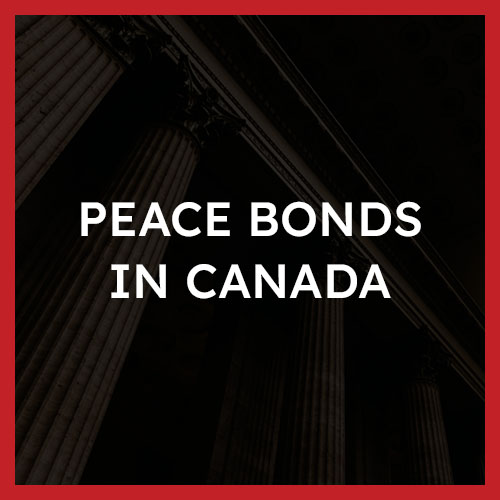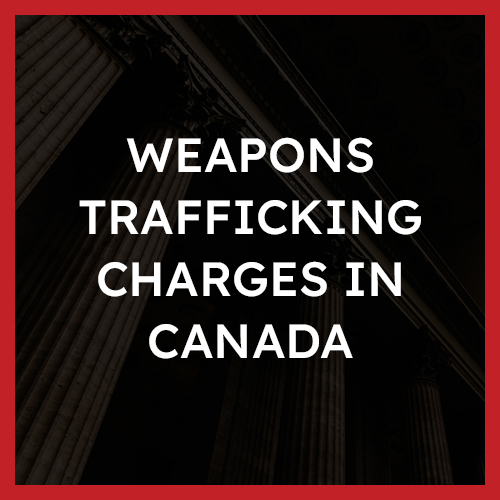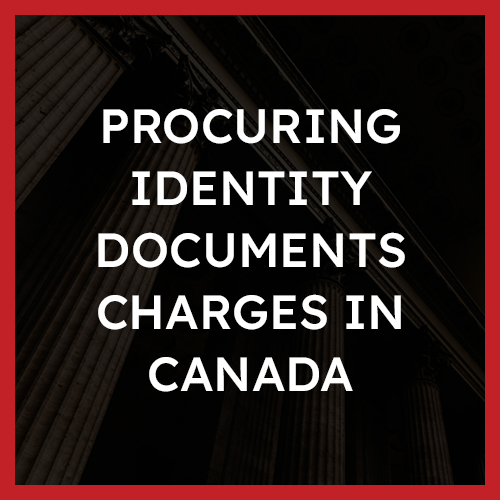What is a peace bond?
 In Canada, a peace bond is an order made by a criminal court that requires an accused to comply with certain conditions for a set period of time. A peace bond can be ordered when an accused has been charged with a violent offence or is likely to commit a violent offence, and the Crown Prosecutor and the court are confident that the peace bond is an effective way of dealing with the accused’s criminal matter. The purpose of the peace bond is to protect the victims of the offence and to prevent the accused from committing further crimes. In many cases, a peace bond is an excellent way of resolving a criminal matter as it allows the accused to avoid a criminal record without the added strain of running a trial.
In Canada, a peace bond is an order made by a criminal court that requires an accused to comply with certain conditions for a set period of time. A peace bond can be ordered when an accused has been charged with a violent offence or is likely to commit a violent offence, and the Crown Prosecutor and the court are confident that the peace bond is an effective way of dealing with the accused’s criminal matter. The purpose of the peace bond is to protect the victims of the offence and to prevent the accused from committing further crimes. In many cases, a peace bond is an excellent way of resolving a criminal matter as it allows the accused to avoid a criminal record without the added strain of running a trial.
Who Can Get a Peace Bond
A peace bond can be sought by a complainant who has a legitimate reason to fear that an accused will commit a violent offence against him or her, or by an accused as a means of resolving his or her criminal matter. Typically people who request peace bonds are victims of violent crimes like assault, domestic assault, or criminal harassment, and who believe that the accused poses a threat to their safety.
If a complainant is the one requesting a peace bond, once he or she has made an application for the order with the police or before the court, a hearing date will be set in Provincial Court. At the hearing, a Judge will hear evidence as to why the peace bond should be implemented and will decide whether it would be reasonable to grant a peace bond in the circumstances. The type of evidence that a complainant can rely on at this hearing includes the complainant’s own testimony, previously recorded altercations between the complainant and the accused, medical records showing injuries that the complainant suffered as a result of the offence, and proof of damage to property as a result of the offence.
If at the hearing, the Judge finds that a peace bond would be justified in the circumstances, you will be compelled to sign the peace bond. If you refuse to sign the peace bond after it has been ordered by a Judge, you could be given a sentence in prison not exceeding one year.
If you do not agree that a peace bond is appropriate in your circumstances, at the hearing you will have an opportunity to present reasons why the order would not be justified in your case. Alternatively, where there are grounds for the peace bond but you do not agree with some of the conditions, you can make submissions as to why one of the terms should not be implemented. Whether or not you are opposing the peace bond, it is ideal for you to have a criminal defence lawyer present at the hearing. A criminal defence lawyer can present evidence on your behalf and make effective arguments as to why it is not reasonable to implement a peace bond in your case. If the peace bond is unavoidable, a lawyer can also help ensure that at least the terms of the peace bond are reasonable for you.
A peace bond is also often sought by an accused as a means of resolving current criminal charges. For example, if you have been charged with assault, domestic assault or another violent offence, depending on the circumstances of your case you may be able to resolve the matter by signing a peace bond. Once you have signed the peace bond, the charges against you will be withdrawn and you will not receive a criminal record.
In order to get a peace bond, the Crown Prosecutor will first have to be persuaded that this is an effective means of addressing your criminal charges, and your counsel will then have to speak to the matter in court and get consent for the peace bond from the judge. Typically the types of offences that are resolved with a peace bond are fairly minor offences which caused little to no damage to persons or property. If you have a pre-existing criminal record with a number of related offences, you will be less likely to be offered a peace bond as a resolution. However, even in difficult cases a skilled lawyer can utilize weaknesses in the case against you to effectively persuade the Crown to resolve the matter with a peace bond.
What are the different types of peace bonds in Canada?
In Canada, there are more than one type of peace bond: statutory peace bonds issued in accordance with section 810 of the Criminal Code, and common law peace bonds.
Statutory Peace Bonds or Peace Bonds Issued Under Section 810 of the Criminal Code
A statutory peace bond is a peace bond that is issued in accordance with section 810 of the Criminal Code. As stated in section 810, this type of peace bond can be issued by the court upon request of a person who has reasonable grounds to that an accused will cause them harm, or will cause harm to someone that they know. The primary distinction between a statutory peace bond and a common law peace bond is that in order for a statutory peace bond to be sworn, the complainant must have an ongoing fear of the accused.
The basic conditions that should accompany a statutory peace bond are also stipulated in section 810 of the Criminal Code. Specifically, in accordance with this section a peace bond should order that the accused does not consume alcohol or drugs except as prescribed; to submit to drug testing as required; and to stay away from and refrain from communicating with the complainant. In addition, under section 810 the Judge hearing the application has the discretion to implement any other conditions that are reasonably needed or desired to ensure the good conduct of the accused. A peace bond issued under section 810 of the Criminal Code can exist for a maximum period of 12 months, at which point it will expire.
If you breach a statutory peace bond, you will be charged with an offence under section 811 of the Criminal Code. If you are charged with breaching the conditions of a peace bond, the Crown can choose to prosecute you either by way of indictment or by summary conviction. If the Crown chooses to prosecute you by way of indictment, if you are found guilty of the breach you will be liable for a term of imprisonment of up to two years. If the Crown proceeds summarily and you are found guilty, you will be liable to a term of imprisonment of up to six months.
Common Law Peace Bond
Another type of peace bond that can be obtained in Canada is a common law peace bond. Unlike a statutory peace bond, in order to obtain a common law peace bond it is not necessary that the complainant has a present or ongoing fear of the accused. Rather, a common law peace bond has a wider scope as it can be implemented when there is a reasonable basis to believe that the accused may breach the peace generally, not just act violently against a specific person or group of people. Because fear is not a requirement for a common law peace bond, this type of peace bond can be used to resolve criminal matters where the complainant and the accused would like to reconcile and continue to have a relationship.
While a common law peace bond differs in scope from a statutory peace bond, the conditions that accompany a common law peace bond will often be similar to those that accompany a peace bond issued under section 810 of the Criminal Code. That is, like a statutory peace bond a common law peace bond will often contain conditions such as keeping the peace and being of good behaviour, refraining from contacting the complainant, and can include weapons and firearms prohibitions. However, unlike statutory peace bonds, common law peace bonds can last longer than one year.
As with statutory peace bonds, if the accused is caught breaching the terms of the order, he or she will be charged with a criminal offence. While the accused will be charged under section 127 instead of section 811 of the Criminal Code for breaching a common law peace bond, the punishment is the same. That is, if found guilty of the breach, the accused will be liable for a term of imprisonment of up to two years if the Crown proceeds by indictment, or six months if the Crown proceeds summarily.
How will a peace bond affect my criminal record?
One of the most important things to know about a peace bond is that it is not a finding of guilt nor is it an admission of guilt. As such, you will not get a criminal record for signing a peace bond. In fact, when agreeing to sign a peace bond, it is not even necessary to admit to the facts of the case as they are presented by the Crown Prosecutor.
While a peace bond will not give you a criminal record, it will show up on some enhanced record checks. Whether a peace bond will show up on your criminal record check depends on the type of record check that is completed.
Police Criminal Record Check
A police record check is the most basic type of record check, and it is often requested for employment or volunteer purposes. This type of record check will only show convictions that you received as an adult and convictions that you received as a youth. A peace bond will not appear on this type of record check.
Police Information Check
A police information check is more comprehensive than a criminal record check, and it will be the type of record check that some volunteer or employment positions require that you provide when applying to the position. This record check will not show charges that were withdrawn, dismissed, or diverted, but it will show a peace bond for the duration of the year that it is in place.
Police Vulnerable Sector Check
This record check is the most comprehensive type of record check. It will show peace bonds while they are in place, and it may also show charges that were withdrawn or stayed. However, it will not show charges that were diverted.
Peace Bond or Trial? Which One is Better?
It may be the case that you have been offered a peace bond as a means of resolving your charge, but you are wondering if it would be better to proceed to trial. While going to trial will offer you the prospect of being completely acquitted of your charges, it is often extremely advantageous to sign a peace bond instead.
Perhaps the greatest benefit to accepting a peace bond instead of going to trial is that you will have certainty with respect to the outcome of your matter. Even when it seems as though you have a strong case and a high likelihood of succeeding, there is always an inevitable element of uncertainty at trial. It is important to remember that while judges do their best to decide the case fairly and impartially, your case is still being judged by a person, and it is impossible to guess with 100% certainty what that person will think of the evidence that is put before them in court. Further, you can never truly know what witnesses will show up, how they will testify, and whether their evidence will truly support your case until they are actually are put on the stand. As such, there is always a chance of being convicted even in the seemingly clearest of cases.
By contrast, a peace bond eliminates this element of uncertainty and gives you a measure of control over the outcome of your matter. So long as you chose to comply with the conditions of the peace bond, you know that the charges against you will be withdrawn and that you will be able to avoid a criminal record.
The Difference Between A Peace Bond And A Restraining Order Or A Probation Order:
Many people wonder how a peace bond is different than a restraining order or a probation order. Firstly, a peace bond is different from a restraining order in that a peace bond is a form of recognizance issued by a criminal court as a part of criminal proceedings. By contrast, a restraining order is issued by a judge in family court for the purpose of protecting a spouse or other family members after a complaint of family violence has been made. Unlike a peace bond issued in accordance with the Criminal Code, to get a restraining order the complainant does not need to show fear of the accused.
Both a peace bond and a restraining order will impose certain conditions on the person being accused of violence, and the person being accused will have to comply with those conditions for the entire duration of the bond or order. If the conditions are breached, the accused can be arrested by the police and charged with a criminal offence. However, the conditions that will be imposed when you sign a peace bond or when you are given a restraining order will be different.
Generally speaking, if you are given a restraining order the conditions that will be imposed on you will only restrict your ability to go near, or contact the person who sought the order. With a peace bond, the conditions imposed on you will go beyond a no-contact order. Specifically, in addition to being precluded from contacting the complainant, you will be directed to keep the peace and be of good behaviour, you may receive a weapons or firearms prohibition, and you may be ordered to abstain from drinking or to seek counselling amongst other conditions.
Another common point of confusion is how a peace bond differs from a probation order. While the conditions imposed on an accused by a peace bond can be similar to the conditions imposed on someone on probation, the two are not the same. The most important difference between probation and a peace bond is that a probation order will follow a criminal conviction, whereas a peace bond is not a conviction, nor is it even an admission of guilt. Further, in some circumstances, you are free to choose whether you enter into a peace bond, but you have no such freedom of choice when you have been convicted of an offence and receive a probation order. However, even though you are not found guilty of a criminal offence when you sign a peace bond, as with breaching probation, it is a criminal offence to breach the conditions of a peace bond.
Types Of Criminal Charges That Can Be Resolved With A Peace Bond
Generally speaking, peace bonds are used to resolve violent offences in instances where an accused does not have an extremely lengthy criminal record, and where the offence was fairly minor despite being violent. The most common offences that are resolved by way of a peace bond are minor assaults, minor incidents of domestic violence, criminal harassment, and uttering threats. In some rare cases, you may be able to get a peace bond for more serious offences such as child pornography, assault with a weapon, and assault causing bodily harm.
What conditions will I have if I sign a peace bond?
Once a peace bond is implemented, you will be obliged to comply with a number of conditions. If you fail to comply with the conditions stipulated by a peace bond, you will be charged with a serious criminal offence. In the event of a conviction for a breach, you will face a sentence of up to four years of time served in prison. Furthermore, in the event of a conviction, you will also be required to forfeit any money that you promised to pay the court in the event of a breach, or that you already paid the court for a deposit as a condition of the peace bond.
The conditions that are generally stipulated by a peace bond include, but are not limited to:
- Keeping the peace and being of good behaviour;
- Abstaining from consuming drugs and alcohol;
- Reporting to a probation officer for drug and alcohol testing as required;
- Not contacting the person or persons protected by the order. This includes direct and indirect communication. So you will not be allowed to call the person, send them messages over Facebook, text or email, and you cannot communicate with them through other people.
- Stay a certain distance away from the complainant’s home and or work;
- Not owning any firearms or weapons;
- Pay a surety or a deposit to the court, or promise to pay a surety to the court in the event of a breach;
- Any other condition that the Justice or Judge hearing the application may deem reasonable and necessary to ensure your compliance with the order, to protect the complainants, and to prevent the further commission of a crime.
When signing a peace bond it is in your utmost interest that you are represented by a criminal defence lawyer. This is so because it will often be the case that the conditions that are being imposed on you may be unreasonably difficult for you to comply with. Prior to signing a peace bond, you should consult with one of our skilled defence lawyers who can negotiate with the Crown Prosecutor and reach a joint submission with respect to what conditions should be imposed by the court. When the Crown and your defence jointly propose conditions to the court, as long as the conditions comply with the law it is often the case that the judge will also consent to the conditions, and that you will be able to avoid anything too unreasonable or difficult to contend with.
What’s Next?
To find out whether your case is eligible for a peace bond resolution please contact our office for a free consultation. It is important to get legal advice regarding your case as soon as possible.
You will receive advice regarding the merits of your case, and what you can do to maximize your chances of receiving a peace bond resolution.
About The Author
Ask A Question
We endeavor to respond to questions within 24 hours. If your matter is urgent, please call our office or submit a request for a free consultation.







